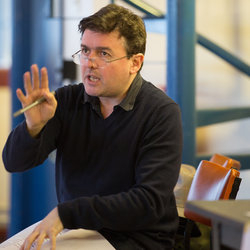Sheffield Theatres continue Brian Friel season with launch of Wonderful Tennessee
Director Paul Miller and cast members Cathy Belton and Luke Carver Goss discuss working on Friel’s “overlooked” 1993 play
"The great thing about doing a season of one writer's work, is that you can do the iconic play, but you can also do the overlooked play", explains Paul Miller. The neglected piece he is referring to is Wonderful Tennessee, his directorial contribution to Sheffield Theatres' Brian Friel season, to be staged at the Lyceum Theatre shortly after Friel's hit play Translations opens at the Crucible. Miller feels that this "very personal play" will make extra sense when seen in the context of Friel's other work.

© Mark Douet
Miller describes the piece as a "classic reunion play about shared experience and family memories, brought about by remembering tiny fragments of songs". But though music and singing feature prominently, Miller is keen to convey that Wonderful Tennessee is "absolutely not a musical". Luke Carver Goss, who plays the musician George and doubles as musical director for the piece, agrees: "In a musical, you get an introduction from a band to make sure everyone is in the right key; here the singers start the songs before the musicians play, so there's a sense of informality to it – of everyone singing together".
The piece contains several songs: some complete, some just memories and fragments. As musical director, Carver Goss was charged with sourcing the music, which is referenced, but not scored, in the text. One of the key songs, "I don't know why I'm happy", proved so elusive that Carver Goss had to resort to faxing Friel's agent for clues. The response he received was a series of handwritten notes unattached to any sort of stave. Carver Goss was undeterred: "it just re-enforces the idea of song as a fragment of memory", he explains. "The song we sing has been recreated as an approximation of what might have been the tune in Friel's mind".
Stylistically, the music is diverse. The main song, which gives the play its title, is the American folk song "Tennessee". "It's a reflective song", considers Carver Goss, "with verses that apply beautifully and painfully to the plights of the characters. But there are also several cockney music hall numbers. Most of the music comes from a generation before that of the characters – from their parents' childhoods. They remember the songs their mums and dads used to sing. They force themselves to have a good time through music; to be together and to sing together".
This relationship with music contributes to the play's themes. As Carver Goss describes, "the play is about how modernity comes into conflict with older themes. It is about ritual; the numinous; the sense of wonder of the world. There is the feeling that the characters are trying to create a ritual".
Cathy Belton, who plays Berna, agrees: "At the end of the play, something huge has happened. It is almost as though an act of theatre has happened, because a transformation has happened, and that is what I believe theatre should be about: putting people together and hoping they are some way transformed. And these characters – when the sun comes up the next morning, something huge has happened. By the end of the night, they have come through a ceremony of sharing".
So how does Miller's production aims to capture this sense of ritual and wonder? "Friel is a poet, but he is a stage poet", he clarifies. "What he puts on stage is real. It has a poetic effect, but the action of the play and what happens is all drawn from life in a recognisable way, though it is largely about inexplicable things".
What is most apparent is the company's love and respect for their material. "Friel is a lot of people's favourite playwright", Miller recognises. "It's a mark of the esteem in which he is held that we've been able to attract this calibre of actors for all of the plays in the season". "Friel is so good, so specific", extols Belton. "He gifts us a good score. You just have to open yourself to that score and trust it; try to make it sing as good – no, as true – as possible".
Wonderful Tennessee runs at the Lyceum Sheffield from 27 February to 8 March 2014.












